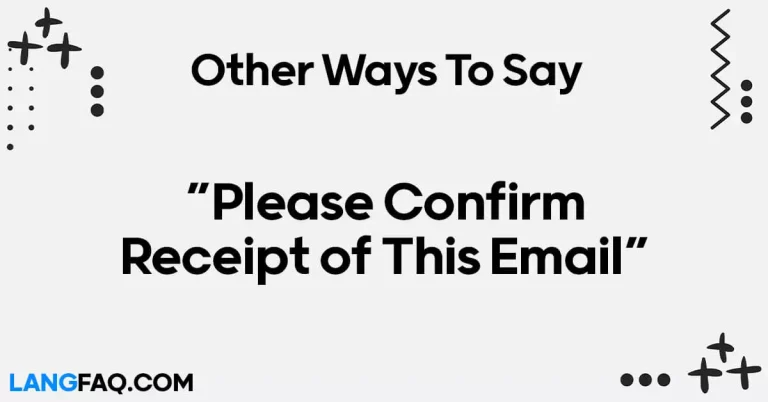In the realm of language, finding alternative phrases for common expressions not only enriches vocabulary but also fosters effective communication. One such phrase often used in conversations is “God forbid.” While its usage may be habitual, diversifying your linguistic arsenal with alternative expressions can add depth and nuance to your speech. In this article, we delve into 12 other ways to say “God forbid,” offering you a repertoire of phrases to safeguard your conversations from negative connotations.
12 Other Ways to Say “God Forbid”
Here are 12 other ways to say “God forbid”:
- Heaven forbid!
- Perish the thought!
- Let’s hope not!
- May it never be!
- Spare us!
- Let’s pray it doesn’t happen.
- Wishing against it!
- Let’s steer clear of that!
- May it never come to pass!
- I hope not!
- Praying for the best!
- Hopefully, it’ll never occur.
| Phrase | Meaning | Example |
|---|---|---|
| Heaven forbid | Expressing a strong wish that something doesn’t happen | Heaven forbid we should ever have to go through that again. |
| Perish the thought | Hoping that something undesirable never occurs | Perish the thought of any harm coming to our loved ones. |
| May it never be | Wishing fervently that something doesn’t happen | May it never be that we lose touch with each other. |
| Let’s hope not | Expressing hope that a negative outcome is avoided | Let’s hope not that we encounter any more delays. |
| In no way | Asserting that something will not happen under any circumstances | In no way will we compromise on quality. |
| By no means | Emphasizing that something is absolutely not the case | By no means should you underestimate the challenge ahead. |
| It must not happen | Stating that a particular event or outcome is unacceptable | It must not happen that our efforts go unnoticed. |
| We pray it doesn’t happen | Expressing a strong desire that something undesirable is avoided | We pray it doesn’t happen that our community suffers any more losses. |
| Let’s trust it doesn’t occur | Demonstrating confidence that a negative event won’t take place | Let’s trust it doesn’t occur that our plans fall through. |
| Hopefully not | Expressing optimism that something undesirable won’t happen | Hopefully not, but we should be prepared for any eventuality. |
| Praying it won’t happen | Showing faith and hope that a negative outcome is averted | Praying it won’t happen that our dreams remain unfulfilled. |
| Let’s steer clear of that | Urging avoidance of a potential problem or undesirable outcome | Let’s steer clear of that potential conflict to maintain harmony. |
These alternative expressions to “God forbid” offer a variety of ways to convey the same sentiment of hoping, wishing, or praying that something undesirable does not occur. Whether formal or informal, each phrase emphasizes the desire to avoid negative outcomes and maintain positivity in facing challenges. By incorporating these phrases into our language, we can effectively express our hopes and concerns while encouraging resilience and optimism in ourselves and others.
Is It Correct to Say “God Forbid”?
Certainly! Here’s the sentence broken down into individual lines:
Yes, it is correct to say “God forbid.”
This phrase is commonly used to express a fervent wish or prayer that something undesirable will not happen.
It is often used to convey a sense of urgency or seriousness about avoiding negative outcomes.
While the phrase may carry religious connotations due to the mention of “God,” it is also used in secular contexts as a culturally accepted expression.
However, it’s essential to be mindful of the sensitivities of those who may not share the same religious beliefs.
And to use the phrase appropriately and respectfully in diverse settings.
Professional Mail Example With “God Forbid”
Subject: Urgent: Potential Security Breach Alert
Dear [Recipient’s Name],
I hope this message finds you well.
I am reaching out to inform you of a concerning matter that has come to our attention.
Our cybersecurity team has detected unusual activity within our network, indicating a potential security breach.
While we are taking immediate steps to investigate and contain the situation,
I felt it necessary to notify you as a precautionary measure.
God forbid, but if this breach escalates, it could pose a significant risk to our sensitive data
and compromise the integrity of our systems.
As such, I urge you to remain vigilant and adhere strictly to our company’s security protocols
until further notice.
Please refrain from accessing any sensitive information or sharing confidential data
until we can confirm that our systems are secure.
Rest assured that we are devoting all available resources
to address this issue swiftly and effectively.
We will keep you updated on any developments and provide guidance on next steps as needed.
Thank you for your cooperation and understanding
as we work together to safeguard our organization
against potential threats.
Best regards,
[Your Name]
[Your Position]
[Your Contact Information]
Heaven forbid!
When you want to express a strong desire for something not to happen, “Heaven forbid!” is a powerful phrase to use. It’s often employed in both formal and informal settings to convey a sense of urgency or seriousness about avoiding a negative outcome.
Scenario:
Formal Context: During a business meeting, when discussing potential risks or challenges, you might use “Heaven forbid!” to emphasize the importance of avoiding certain scenarios. For example, “Heaven forbid we experience another financial crisis like in 2008. Our strategies must ensure stability and growth.”
Informal Context: In a casual conversation among friends, if someone mentions the possibility of getting sick before a planned vacation, you could respond with, “Heaven forbid! We’ve been looking forward to this trip for months.”
Example:
Formal: “Heaven forbid we lose our biggest client. Our company’s stability relies heavily on their partnership.”
Informal: “Heaven forbid anything happens to your pet while you’re away. They’re like family to you!”
Email Sample:
Subject: Urgent: Updates to Project Timeline
Dear Team,
Heaven forbid, but it seems there may be a delay in the delivery of crucial materials for our upcoming project. Let’s regroup tomorrow morning to discuss contingency plans and ensure we stay on track.
Best regards, [Your Name]
Variations:
- Colleague to Colleague: “Heaven forbid we miss our deadline. Let’s double our efforts to meet it.”
- Mentor to Mentee: “Heaven forbid you overlook this crucial detail. Pay close attention to it.”
- Friend to Friend: “Heaven forbid anything goes wrong on your big day. I’ll be there to support you no matter what.”
Insights:
According to the Cambridge Dictionary, “Heaven forbid!” is used to say that you hope that something will not happen. It’s a common idiomatic expression that reflects a desire to avoid undesirable outcomes.
Pros:
- Conveys a strong sense of urgency or seriousness.
- Suitable for various contexts, from formal meetings to casual conversations.
- Expresses empathy and concern for others.
Cons:
- May sound overly dramatic in some situations.
- Should be used judiciously to maintain sincerity.
Grammar/Usage Rules:
- Use “Heaven forbid!” to express a fervent wish or hope that something does not happen.
- Can be followed by a clause or statement describing the undesirable outcome you wish to avoid.
Tips:
- Pair “Heaven forbid!” with supportive actions or suggestions to demonstrate your commitment to avoiding negative outcomes.
- Consider the tone and context when using this phrase to ensure it aligns with the conversation’s mood and purpose.
Perish the thought!
“Perish the thought!” is a colorful way to dismiss the idea of something undesirable happening. It’s often used to express disbelief or to reassure someone that a negative outcome is unlikely.
Scenario:
Formal Context: In a professional setting, if a colleague suggests a risky strategy, you might respond with, “Perish the thought! We need a more conservative approach to ensure success.”
Informal Context: When a friend jokingly suggests canceling plans due to bad weather, you could playfully respond with, “Perish the thought! We’ll have a blast rain or shine.”
Example:
Formal: “Perish the thought of our company going bankrupt. With proper financial management, we’ll weather any storm.”
Informal: “Perish the thought of you forgetting my birthday again! It’s marked on your calendar, right?”
Email Sample:
Subject: Re: Meeting Agenda for Tomorrow
Dear Team,
Perish the thought of forgetting our meeting tomorrow! Please review the updated agenda and come prepared to discuss key action items.
Looking forward to productive discussions, [Your Name]
Variations:
- Colleague to Colleague: “Perish the thought of missing our sales targets. Let’s ramp up our efforts to exceed expectations.”
- Mentor to Mentee: “Perish the thought of doubting your abilities. You’re capable of achieving great things with dedication and hard work.”
- Friend to Friend: “Perish the thought of us drifting apart. Our friendship means the world to me, and I’ll always be here for you.”
Insights:
According to the Cambridge Dictionary, “Perish the thought!” is used to say that you hope that something will not happen because it would be very unpleasant or upsetting. It’s an idiomatic expression that adds flair to conversations while expressing a desire to avoid negative outcomes.
Pros:
- Adds a touch of drama and humor to conversations.
- Conveys reassurance and confidence in avoiding undesirable outcomes.
- Suitable for various contexts, from formal discussions to casual banter.
Cons:
- May come across as overly theatrical in some situations.
- Should be used sparingly to maintain its impact and sincerity.
Grammar/Usage Rules:
- Use “Perish the thought!” to dismiss the idea of something unpleasant happening.
- Often followed by an exclamation mark to emphasize the sentiment.
Tips:
- Use “Perish the thought!” sparingly and in appropriate contexts to maintain its effectiveness.
- Pair it with positive affirmations or alternative solutions to reassure others and steer the conversation in a constructive direction.
Let’s hope not!
“Let’s hope not!” is a simple yet effective way to express a desire for something undesirable to be avoided. It’s commonly used in both formal and informal conversations to convey optimism while acknowledging the possibility of negative outcomes.
Scenario:
Formal Context: During a business meeting, if someone mentions the potential for project delays, you might respond with, “Let’s hope not! We’ve implemented contingency plans to minimize risks.”
Informal Context: When discussing travel plans with a friend and the possibility of flight cancellations arises, you could say, “Let’s hope not! I’ve been looking forward to this trip for months.”
Example:
Formal: “Let’s hope not that our competitors gain an edge over us. Our innovative strategies should keep us ahead in the market.”
Informal: “Let’s hope not that it rains on our picnic day. We’ve been planning this outing for weeks!”
Email Sample:
Subject: Urgent: Potential Delays in Project Timeline
Dear Team,
Let’s hope not, but there’s a chance we might encounter delays in the delivery of essential materials for our project. Let’s convene for a quick brainstorming session to explore alternative solutions and mitigate any potential setbacks.
Best regards, [Your Name]
Variations:
- Colleague to Colleague: “Let’s hope not that our budget gets slashed. We’ll need to justify every expense to maintain funding.”
- Mentor to Mentee: “Let’s hope not that you forget to double-check your work. Attention to detail is crucial for success.”
- Friend to Friend: “Let’s hope not that the concert gets canceled. We’ve been waiting for this event for ages!”
Insights:
According to the Cambridge Dictionary, “Let’s hope not!” is used to say that you hope something will not happen. It’s a straightforward expression of optimism and a shared desire to avoid negative outcomes.
Pros:
- Conveys optimism and positivity in facing potential challenges.
- Encourages collaboration and shared hope for favorable outcomes.
- Suitable for various contexts, from professional settings to casual conversations.
Cons:
- Can sometimes come across as overly simplistic or dismissive of potential risks.
- Should be used with caution in serious or high-stakes situations to maintain professionalism.
Grammar/Usage Rules:
- Use “Let’s hope not!” to express a shared hope or desire to avoid negative outcomes.
- Can be followed by a clause describing the undesirable outcome you wish to avoid.
Tips:
- Use “Let’s hope not!” to acknowledge potential risks while maintaining a positive outlook on future possibilities.
- Follow up with proactive suggestions or actions to demonstrate commitment to avoiding negative outcomes.
May it never be!
“May it never be!” is a solemn expression used to convey a strong wish or prayer for something undesirable to never occur. It carries a sense of hope and determination to avoid negative outcomes.
Scenario:
Formal Context: In a boardroom discussion about potential legal issues, you might solemnly state, “May it never be that we face litigation. Let’s ensure our contracts are watertight.”
Informal Context: When discussing health concerns with a friend, you could express, “May it never be that you suffer any serious illnesses. Take care of yourself and prioritize your well-being.”
Example:
Formal: “May it never be that our company faces bankruptcy. We must exercise prudent financial management to safeguard our stability.”
Informal: “May it never be that we lose touch with each other. Our friendship means too much to me.”
Email Sample:
Subject: Urgent: Potential Security Breach
Dear Team,
May it never be that our systems are compromised, but we’ve received reports of a potential security breach. Let’s convene an emergency meeting to assess the situation and implement immediate countermeasures.
Warm regards, [Your Name]
Variations:
- Colleague to Colleague: “May it never be that our reputation is tarnished. Let’s uphold the highest standards of professionalism in all our interactions.”
- Mentor to Mentee: “May it never be that you lose sight of your goals. Stay focused and resilient, and success will follow.”
- Friend to Friend: “May it never be that we drift apart. Let’s make an effort to stay connected and support each other through thick and thin.”
Insights:
According to the Cambridge Dictionary, “May it never be!” is used to express a strong hope that something will not happen. It’s an earnest expression of desire to avoid negative outcomes, often with a sense of solemnity or gravity.
Pros:
- Conveys a sense of solemnity and sincerity in expressing hope for positive outcomes.
- Reflects a strong desire to avoid negative consequences, whether in formal or informal contexts.
- Encourages reflection on potential risks and proactive measures to mitigate them.
Cons:
- Can sound overly formal or solemn in casual conversations, depending on the tone and context.
- Should be used judiciously to maintain sincerity and avoid sounding melodramatic.
Grammar/Usage Rules:
- Use “May it never be!” to express a fervent hope or prayer that something undesirable will not occur.
- Can be followed by a clause or statement describing the undesirable outcome you wish to avoid.
Tips:
- Use “May it never be!” to express empathy and solidarity with others facing potential challenges or hardships.
- Pair it with supportive actions or suggestions to demonstrate commitment to avoiding negative outcomes and fostering positive outcomes.
Spare us!
“Spare us!” is a direct and urgent plea to avoid or be protected from something undesirable. It’s often used in both formal and informal contexts to express a sense of urgency or desperation in avoiding negative outcomes.
Scenario:
Formal Context: During a project review meeting, if someone suggests a risky approach, you might interject with, “Spare us! We can’t afford to take such risks with our timeline.”
Informal Context: When discussing potential travel disruptions with a friend, you could exclaim, “Spare us from flight cancellations! We’ve been looking forward to this trip for ages.”
Example:
Formal: “Spare us from any further delays in production. Our clients are counting on timely delivery to meet their own deadlines.”
Informal: “Spare us from another boring lecture on time management! We get it, but let’s move on to more engaging topics.”
Email Sample:
Subject: Urgent: Data Security Breach Alert
Dear Team,
Spare us from a potential data breach, but our systems have detected suspicious activity. Immediate action is required to safeguard our sensitive information. Please review the attached security protocols and report any irregularities.
Best regards, [Your Name]
Variations:
- Colleague to Colleague: “Spare us from budget cuts! We need adequate resources to meet our project objectives.”
- Mentor to Mentee: “Spare us from rookie mistakes! Double-check your work to ensure accuracy and quality.”
- Friend to Friend: “Spare us from another rainy day! Let’s plan indoor activities to brighten our spirits.”
Insights:
According to the Cambridge Dictionary, “Spare us!” is used to ask someone not to allow something unpleasant to happen or to say that you do not want to hear or experience something. It’s a straightforward and assertive expression of a desire to avoid negative outcomes.
Pros:
- Conveys a sense of urgency and desperation in avoiding undesirable outcomes.
- Assertive and direct, making it clear that certain scenarios are unacceptable.
- Suitable for various contexts, from professional discussions to informal conversations.
Cons:
- Can sound demanding or confrontational if used inappropriately or excessively.
- Should be used judiciously to maintain sincerity and avoid alienating others.
Grammar/Usage Rules:
- Use “Spare us!” to make a direct plea or request to avoid something undesirable.
- Often followed by a clause or statement describing the undesirable outcome you wish to avoid.
Tips:
- Use “Spare us!” to cut through ambiguity and emphasize the seriousness of certain situations.
- Follow up with proactive suggestions or solutions to demonstrate commitment to avoiding negative outcomes and finding resolutions.
Let’s pray it doesn’t happen.
“Let’s pray it doesn’t happen” is a hopeful yet realistic expression of a desire to avoid undesirable outcomes. It combines a sense of faith or optimism with acknowledgment of potential risks.
Scenario:
Formal Context: During a risk assessment meeting, if someone raises concerns about potential supply chain disruptions, you might respond with, “Let’s pray it doesn’t happen, but we must have contingency plans in place to mitigate any disruptions.”
Informal Context: When discussing potential health issues with a family member, you could say, “Let’s pray it doesn’t happen, but we should also take preventive measures like eating healthily and staying active.”
Example:
Formal: “Let’s pray it doesn’t happen that our key supplier goes out of business. However, we must also explore alternative suppliers to minimize risks.”
Informal: “Let’s pray it doesn’t happen that our flight gets delayed, but we should also check for alternative flights just in case.”
Email Sample:
Subject: Urgent: Potential Security Breach Alert
Dear Team,
Let’s pray it doesn’t happen, but our IT department has detected suspicious activity indicating a potential security breach. We must act swiftly to contain the situation and safeguard our data. Please review the attached security protocols and report any anomalies immediately.
Best regards, [Your Name]
Variations:
- Colleague to Colleague: “Let’s pray it doesn’t happen that our project gets derailed by unexpected setbacks. We need to stay focused and adaptable to overcome any challenges.”
- Mentor to Mentee: “Let’s pray it doesn’t happen that you forget to prioritize your tasks. Time management is key to success, but I’m here to support you every step of the way.”
- Friend to Friend: “Let’s pray it doesn’t happen that our plans for the weekend get ruined by bad weather. We can always come up with indoor activities as a backup plan.”
Insights:
According to the Cambridge Dictionary, “Let’s pray it doesn’t happen” is an expression used to say that you hope something will not happen, often in a situation where there is a risk of something bad occurring. It reflects a blend of hopefulness and acknowledgment of potential risks.
Pros:
- Conveys a sense of hope and optimism in facing potential challenges or risks.
- Recognizes the reality of potential negative outcomes while maintaining a positive outlook.
- Suitable for various contexts, from professional discussions to personal conversations.
Cons:
- Relies on faith or hope, which may not always be sufficient to prevent negative outcomes.
- Should be used with caution to avoid sounding dismissive of potential risks or challenges.
Grammar/Usage Rules:
- Use “Let’s pray it doesn’t happen” to express a hopeful desire that something undesirable will not occur.
- Can be followed by a clause or statement describing the undesirable outcome you wish to avoid.
Tips:
- Pair “Let’s pray it doesn’t happen” with proactive planning and preparation to demonstrate a commitment to avoiding negative outcomes.
- Use it as a means of acknowledging potential risks while maintaining a positive and hopeful attitude toward the future.
Wishing against it!
“Wishing against it!” is a phrase used to express a fervent desire for something undesirable not to occur. It conveys a sense of hopefulness and determination to avoid negative outcomes.
Scenario:
Formal Context: In a risk management meeting, if there’s concern about a potential lawsuit, you might assert, “Wishing against it! We need to review our legal documentation to ensure compliance and minimize liability.”
Informal Context: When discussing potential car troubles with a friend, you could say, “Wishing against it! Make sure you schedule regular maintenance to prevent any issues.”
Example:
Formal: “Wishing against it that our project faces further delays. Let’s allocate additional resources to ensure timely completion.”
Informal: “Wishing against it that you catch a cold before your big presentation! Get plenty of rest and stay hydrated.”
Email Sample:
Subject: Urgent: Potential Data Breach Alert
Dear Team,
Wishing against it, but our cybersecurity team has detected unusual activity indicating a potential data breach. It’s imperative that we act swiftly to contain the situation and protect our sensitive information. Please review the attached security protocols and report any suspicious behavior immediately.
Best regards, [Your Name]
Variations:
- Colleague to Colleague: “Wishing against it that our department faces budget cuts. Let’s prepare a compelling case to demonstrate our value and secure adequate funding.”
- Mentor to Mentee: “Wishing against it that you miss the deadline for your project. Prioritize your tasks and seek support if needed to ensure timely completion.”
- Friend to Friend: “Wishing against it that our plans for the weekend get ruined by bad weather. Let’s stay flexible and come up with alternative activities just in case.”
Insights:
“Wishing against it!” is an expression that reflects a strong desire or hope for something undesirable not to occur. While it may seem superstitious or fanciful, it embodies a sense of determination to avoid negative outcomes.
Pros:
- Conveys a sense of hope and optimism in facing potential challenges or risks.
- Asserts a desire for positive outcomes while acknowledging the possibility of negative ones.
- Suitable for various contexts, from formal discussions to casual conversations.
Cons:
- Relies on wishful thinking, which may not always be sufficient to prevent negative outcomes.
- Should be used with caution to avoid appearing dismissive of potential risks or challenges.
Grammar/Usage Rules:
- Use “Wishing against it!” to express a fervent hope or desire that something undesirable will not occur.
- Can be followed by a clause or statement describing the undesirable outcome you wish to avoid.
Tips:
- Pair “Wishing against it!” with proactive planning and preparation to demonstrate a commitment to avoiding negative outcomes.
- Use it as a means of acknowledging potential risks while maintaining a positive and hopeful attitude toward the future.
Let’s steer clear of that!
“Let’s steer clear of that!” is a proactive statement urging avoidance of a potentially problematic situation or outcome. It emphasizes the importance of taking preventative action to prevent negative consequences.
Scenario:
Formal Context: In a project management meeting, if someone suggests a risky course of action, you might intervene with, “Let’s steer clear of that! We need to prioritize strategies with proven success rates to ensure project success.”
Informal Context: When discussing potential conflicts with a friend, you could advise, “Let’s steer clear of that drama! It’s not worth getting involved in unnecessary arguments.”
Example:
Formal: “Let’s steer clear of that potential conflict of interest. We must maintain transparency and integrity in all our business dealings.”
Informal: “Let’s steer clear of that sketchy neighborhood. Safety should always come first.”
Email Sample:
Subject: Urgent: Potential Compliance Violation
Dear Team,
Let’s steer clear of that potential compliance violation! Our recent audit flagged some discrepancies that require immediate attention. Please review the attached audit findings and ensure compliance with regulatory standards.
Best regards, [Your Name]
Variations:
- Colleague to Colleague: “Let’s steer clear of that miscommunication. Clear and concise communication is key to avoiding misunderstandings.”
- Mentor to Mentee: “Let’s steer clear of that procrastination habit. Prioritize your tasks and break them down into manageable steps to stay on track.”
- Friend to Friend: “Let’s steer clear of that negative energy. Surround yourself with positivity and focus on what brings you joy.”
Insights:
“Let’s steer clear of that!” is an expression that emphasizes proactive avoidance of potential risks or problems. It encourages taking preventative action to maintain positive outcomes and minimize negative consequences.
Pros:
- Encourages proactive behavior and decision-making to avoid potential risks or problems.
- Asserts a commitment to maintaining integrity, safety, or well-being.
- Suitable for various contexts, from professional settings to personal relationships.
Cons:
- May sound overly cautious or restrictive if used excessively.
- Should be balanced with a willingness to take calculated risks when necessary for growth or progress.
Grammar/Usage Rules:
- Use “Let’s steer clear of that!” to urge avoidance of a potential problem or risky situation.
- Can be followed by a clause or statement describing the situation or outcome to be avoided.
Tips:
- Use “Let’s steer clear of that!” as a proactive reminder to stay focused on positive outcomes and avoid unnecessary risks or conflicts.
- Follow up with specific actions or strategies to prevent or mitigate potential problems, demonstrating a commitment to success and well-being.
May it never come to pass!
“May it never come to pass!” is a heartfelt expression of hope or prayer that something undesirable will never happen. It conveys a sense of urgency and sincerity in wishing to avoid negative outcomes.
Scenario:
Formal Context: In a strategic planning meeting, if someone suggests a scenario with potentially catastrophic consequences, you might respond with, “May it never come to pass! We must identify and address potential risks to safeguard our organization’s future.”
Informal Context: When discussing potential accidents with a family member, you could express, “May it never come to pass that you get injured! Take necessary precautions and stay safe.”
Example:
Formal: “May it never come to pass that our company faces a lawsuit. Let’s ensure our operations comply with all legal regulations to mitigate any potential liabilities.”
Informal: “May it never come to pass that our vacation gets canceled. Let’s keep an eye on the weather forecast and have backup plans in place.”
Email Sample:
Subject: Urgent: Potential Security Breach Alert
Dear Team,
May it never come to pass, but our IT systems have detected suspicious activity that could indicate a potential security breach. It’s crucial that we act swiftly and decisively to protect our sensitive data and mitigate any potential damages. Please review the attached security protocols and report any unusual findings immediately.
Warm regards, [Your Name]
Variations:
- Colleague to Colleague: “May it never come to pass that our department faces layoffs. Let’s explore cost-saving measures and demonstrate our value to the company.”
- Mentor to Mentee: “May it never come to pass that you miss out on important career opportunities. Stay proactive and network effectively to advance your career.”
- Friend to Friend: “May it never come to pass that you experience heartbreak again. You deserve happiness and fulfillment in your relationships.”
Insights:
“May it never come to pass!” is an expression of earnest hope or prayer that something undesirable will not occur. It reflects a genuine desire to avoid negative outcomes and protect against potential harm.
Pros:
- Conveys sincerity and empathy in wishing to avoid negative outcomes.
- Reflects a sense of urgency and determination to take preventive action.
- Suitable for various contexts, from formal discussions to personal conversations.
Cons:
- Relies on hope or faith, which may not always be sufficient to prevent negative outcomes.
- Should be used with sensitivity to avoid dismissing or minimizing the seriousness of potential risks or challenges.
Grammar/Usage Rules:
- Use “May it never come to pass!” to express a heartfelt hope or prayer that something undesirable will not occur.
- Can be followed by a clause or statement describing the undesirable outcome you wish to avoid.
Tips:
- Use “May it never come to pass!” as a sincere expression of concern and support for others facing potential challenges or hardships.
- Follow up with concrete actions or strategies to prevent or mitigate potential problems, demonstrating a commitment to positive outcomes and well-being.
I hope not!
“I hope not!” is a straightforward and versatile expression used to convey a desire or wish for something undesirable not to happen. It can be used in various contexts to express optimism while acknowledging the possibility of negative outcomes.
Scenario:
Formal Context: During a project review meeting, if someone raises concerns about meeting deadlines, you might respond with, “I hope not! Let’s reassess our resources and priorities to ensure we stay on track.”
Informal Context: When discussing potential traffic delays with a friend before a scheduled event, you could say, “I hope not! Let’s leave early to account for any unexpected delays.”
Example:
Formal: “I hope not that our company faces financial losses. Let’s review our budget and expenses to minimize risks.”
Informal: “I hope not that it rains on our outdoor picnic. We’ve been looking forward to it all week!”
Email Sample:
Subject: Urgent: Potential Service Disruption
Dear Team,
I hope not, but there’s a possibility of a service disruption due to maintenance work scheduled for tomorrow. Let’s prepare contingency plans and communicate with our clients to minimize any inconvenience.
Best regards, [Your Name]
Variations:
- Colleague to Colleague: “I hope not that our presentation falls flat. Let’s rehearse thoroughly and anticipate potential questions from the audience.”
- Mentor to Mentee: “I hope not that you struggle with your new project assignment. Reach out if you need guidance or support along the way.”
- Friend to Friend: “I hope not that you forget your wallet again. Let’s double-check before leaving the house!”
Insights:
“I hope not!” is a simple yet effective expression of optimism and concern for avoiding negative outcomes. It acknowledges the possibility of undesirable events while expressing a wish for their avoidance.
Pros:
- Conveys optimism and empathy in wishing to avoid negative outcomes.
- Can be used in various contexts, from formal discussions to casual conversations.
- Allows for flexibility and adaptability in response to potential challenges.
Cons:
- Relies on hope or wishful thinking, which may not always prevent negative outcomes.
- Should be used with sensitivity to avoid minimizing the seriousness of potential risks or challenges.
Grammar/Usage Rules:
- Use “I hope not!” to express a wish or desire that something undesirable will not occur.
- Can be followed by a clause or statement describing the undesirable outcome you wish to avoid.
Tips:
- Use “I hope not!” as a genuine expression of concern and support for others facing potential challenges or uncertainties.
- Follow up with proactive measures or suggestions to mitigate potential risks and demonstrate a commitment to positive outcomes.
Praying it won’t happen!
“Praying it won’t happen!” is an earnest expression of hope and faith, emphasizing a strong desire for something undesirable to be avoided. It conveys sincerity and determination in wishing for a positive outcome.
Scenario:
Formal Context: In a risk assessment meeting, if there’s a discussion about potential legal liabilities, you might assert, “Praying it won’t happen! We need to ensure compliance with all regulations to mitigate any legal risks.”
Informal Context: When discussing potential health issues with a family member, you could express, “Praying it won’t happen! Take all necessary precautions to stay healthy and safe.”
Example:
Formal: “Praying it won’t happen that our company faces a lawsuit. Let’s conduct a thorough review of our contracts and agreements to minimize legal exposure.”
Informal: “Praying it won’t happen that we get stuck in traffic on our way to the airport. Let’s leave early to avoid any delays.”
Email Sample:
Subject: Urgent: Potential Security Breach Alert
Dear Team,
Praying it won’t happen, but our cybersecurity team has identified suspicious activity indicating a potential security breach. We must act swiftly to contain the situation and protect our sensitive data. Please review the attached security protocols and report any anomalies immediately.
Best regards, [Your Name]
Variations:
- Colleague to Colleague: “Praying it won’t happen that our project faces further delays. Let’s allocate additional resources and manpower to stay on schedule.”
- Mentor to Mentee: “Praying it won’t happen that you miss the deadline for your project. Stay organized and focused to ensure timely completion.”
- Friend to Friend: “Praying it won’t happen that you forget your umbrella on a rainy day. Check the weather forecast and be prepared!”
Insights:
“Praying it won’t happen!” is a heartfelt expression of hope and faith, reflecting a strong desire to avoid negative outcomes. It conveys sincerity and empathy, while also acknowledging the uncertainty of the future.
Pros:
- Conveys sincerity and empathy in wishing to avoid negative outcomes.
- Reflects a sense of hope and faith in the face of uncertainty.
- Suitable for various contexts, from formal discussions to personal conversations.
Cons:
- Relies on hope or faith, which may not always prevent negative outcomes.
- Should be used with sensitivity to avoid minimizing the seriousness of potential risks or challenges.
Grammar/Usage Rules:
- Use “Praying it won’t happen!” to express a heartfelt wish or desire that something undesirable will not occur.
- Can be followed by a clause or statement describing the undesirable outcome you wish to avoid.
Tips:
- Use “Praying it won’t happen!” as a genuine expression of concern and support for others facing potential challenges or uncertainties.
- Follow up with proactive measures or suggestions to mitigate potential risks and demonstrate a commitment to positive outcomes.
Let’s trust it doesn’t occur!
“Let’s trust it doesn’t occur!” is an expression of faith and confidence, conveying a strong belief that something undesirable will not happen. It combines hopefulness with trust in positive outcomes.
Scenario:
Formal Context: In a business strategy meeting, if there’s concern about market volatility, you might assert, “Let’s trust it doesn’t occur! We’ve implemented robust risk management strategies to navigate potential fluctuations.”
Informal Context: When discussing potential travel disruptions with a friend, you could say, “Let’s trust it doesn’t occur! We’ve planned this trip meticulously, so hopefully, everything goes smoothly.”
Example:
Formal: “Let’s trust it doesn’t occur that our sales projections fall short. Our marketing team has implemented targeted campaigns to drive growth.”
Informal: “Let’s trust it doesn’t occur that we forget to pack essential items for the camping trip. We’ve made a checklist to ensure we have everything we need.”
Email Sample:
Subject: Urgent: Potential Supply Chain Disruption
Dear Team,
Let’s trust it doesn’t occur, but there’s a risk of a supply chain disruption due to recent logistics challenges. We’re closely monitoring the situation and have contingency plans in place to minimize any impact on our operations. Please remain vigilant and report any issues promptly.
Best regards, [Your Name]
Variations:
- Colleague to Colleague: “Let’s trust it doesn’t occur that our project timeline gets extended. We’re committed to delivering results on schedule by leveraging our team’s expertise and resources.”
- Mentor to Mentee: “Let’s trust it doesn’t occur that you encounter setbacks in your career. Stay focused and proactive in pursuing your goals, and success will follow.”
- Friend to Friend: “Let’s trust it doesn’t occur that our favorite café runs out of coffee. We can’t function without our daily caffeine fix!”
Insights:
“Let’s trust it doesn’t occur!” conveys a sense of faith and confidence in positive outcomes while acknowledging potential risks. It reflects a belief in preparedness and resilience to overcome challenges.
Pros:
- Conveys faith and confidence in positive outcomes, fostering optimism and resilience.
- Acknowledges potential risks while maintaining a hopeful attitude toward the future.
- Suitable for various contexts, from formal discussions to casual conversations.
Cons:
- Relies on trust and optimism, which may not always prevent negative outcomes.
- Should be used with sensitivity to avoid appearing dismissive of potential risks or challenges.
Grammar/Usage Rules:
- Use “Let’s trust it doesn’t occur!” to express confidence and faith that something undesirable will not happen.
- Can be followed by a clause or statement describing the undesirable outcome you wish to avoid.
Tips:
- Use “Let’s trust it doesn’t occur!” as a means of instilling confidence and positivity in facing potential challenges or uncertainties.
- Follow up with proactive measures or strategies to mitigate potential risks and demonstrate a commitment to positive outcomes.
FAQs:
How can I effectively incorporate these phrases into my conversations? To integrate these phrases seamlessly into your speech, practice using them in everyday conversations. Pay attention to context and tone to ensure appropriateness.
Are these phrases suitable for both formal and informal settings? Yes, these phrases can be used in a variety of contexts, including formal meetings, casual conversations, and written correspondence.
Can these phrases be used interchangeably with “God forbid”? While these phrases convey similar sentiments, they may vary in tone and formality. Consider the context and your audience when selecting the most appropriate expression.
Are there cultural considerations to keep in mind when using these phrases? Yes, it’s essential to be mindful of cultural differences and sensitivities when using expressions related to superstition or faith.
How can I expand my repertoire of alternative phrases for common expressions? To broaden your vocabulary, explore literature, engage in conversations with diverse individuals, and actively seek out new expressions and idiomatic phrases.
Where can I find additional resources on effective communication strategies? There are numerous books, online courses, and workshops available on effective communication skills. Additionally, seeking feedback from peers and mentors can help refine your communication abilities.
Conclusion:
In conclusion, diversifying your linguistic repertoire with alternative phrases for common expressions such as “God forbid” enhances your ability to communicate effectively and empathetically. By incorporating phrases like “May it never happen!” and “Let’s pray it doesn’t happen,” you can convey optimism and resilience while steering conversations away from negative connotations. Remember, language is a powerful tool that shapes perceptions and fosters connections. Embrace the opportunity to enrich your vocabulary and elevate your communication skills.







